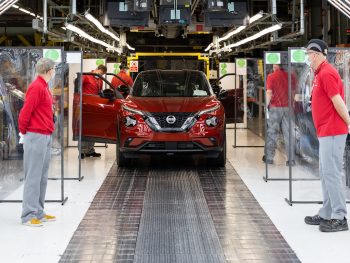UK car production down 11.3% amid ongoing chip shortage
Output from the UK’s car production plants dropped 11.3% in April, hit by the ongoing chip shortage, the impact of the war in Ukraine and model and structural changes.

UK car production continues to be hit by the ongoing chip shortage, the impact of the war in Ukraine and model and structural changes
A total of 60,554 cars rolled off factory lines last month, according to the latest figures released today by the Society of Motor Manufacturers and Traders (SMMT); down by some 7,752 units.
Output is also down 14.7% on the April 2019 pre-pandemic level, which itself had fallen 44.5% on April 2018, due to shutdowns rescheduled to mitigate against the possibility of a no-deal Brexit.
The year-on-year comparison figures continue to be hit by the closure last summer of Honda’s plant in Swindon. This also skewed the year-on-year export comparisons as the plant was a major exporter of models such as the Civic and CR-V to the US. As a result, the SMMT figures for last month show overall production output for overseas markets fell by 20.8%, driven by a 68.0% decline in shipments to the US and a 10.4% drop in those to Asia. In comparison, production for the domestic market was up 60.1% last month; primarily the result of new models coming to market but also flattered by comparison with April 2021 when the economy was restarting after lockdown with subdued demand.
The data also shows carmakers’ continued shift of focus to the latest battery electric, plug-in hybrid and hybrid vehicles. More than one-in-four (26.4%) cars made in April was electrified, equivalent to 16,010 units. That’s up 2.1% on the same month a year ago, boosted by battery electric vehicle output up 38.2% (to 9.9% share).
The SMMT said the figures show how the UK car industry is exposed to a host of issues that are undermining output and competitiveness – and called for a renewed policy focus on industrial and market competitiveness.
Mike Hawes, SMMT chief executive, said: “Global chip shortages and supply chain disruption are exacerbated by spiralling energy costs, additional trading costs and slowing global markets. The foundations of the sector are strong and the transition to zero and ultra-low emission vehicles continues apace but we need more policies and measures that support manufacturing and encourage investment into the UK at this most challenging of times.”
The industry body says UK automotive manufacturing needs relief equivalent to that given to energy intensive industries and access to low-cost and low-carbon energy comparable to European competitors, combined with long-term measures to boost investment in R&D, plant and machinery and skills to drive productivity and competitiveness as the sector transitions to zero carbon technologies.












